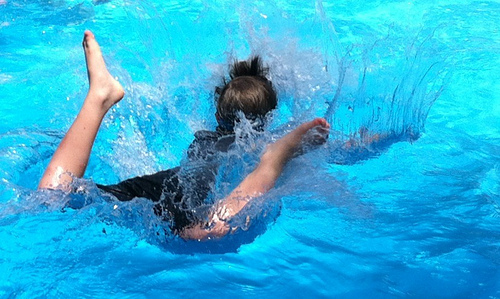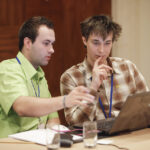A clever person solves a problem. A wise person avoids it. – Albert Einstein

If you always come back from pool parties all red and sore, are you forgetting your sun block, or is it something else? What can you do to avoid it?
What does that mean?
This quote is attributed to Albert Einstein, but probably isn’t true. However, I believe that it is still an interesting quote nonetheless. The quote is about the three stages of learning, clueless, cleverness, and wisdom.
The clueless people don’t notice an obstacle until after they have bumped into it, and then have no idea what to do, and have to puzzle their way out.
The clever people, as noted in the first part of the quote, while still not noticing the obstacle in advance, know what to do after bumping into the obstacle.
The wise people, according to the quote, not only notices the obstacle, they manage to avoid it. Getting to that point takes a bit of learning.
First you’re clueless, then you figure out how to get out of the situation. Finally, with some attention to detail a person can begin to spot the situation before it gets there.
Why is learning important?
If you’ve ever spent time with someone with a learning disability, the reason is pretty clear. Learning is how we move forward. It is also how we figure out how to get around an obstacle. And what we use to detect the obstacle before it becomes trouble.
Learning is how we got from crawling to walking to riding bicycles to driving cars. Learning is how we went from nonsense sounds to speaking words to thinking in concepts. Even after we’re done with school, there are new things to learn. Even us old people are still leaving.
Imagine the rest of your life without any new learning going on. Just as the VCR and the microwave baffled a generation of people who became complacent and weren’t as quick to learn new things, in ten years, that could be you. I don’t know about you, but that’s not where I want to be.
Where can I apply this in my life?
The simple answer is everywhere. However, that takes full dedication to every aspect of our lives, and that’s kind of tiring. Just ask a toddler. That said, we all have things about which we want to find out more, or things we want to get better at doing.
That might be a good place to start your newly energized quest for skill, talent, and knowledge. Another thing to consider is the obstacles you face on a frequent enough basis that it might be worth learning a little more about them. What do you find yourself facing on a semi-regular basis?
Start by figuring out what you can do to be better prepared? That way the next time something happens, you have the tools at hand to make things easier to fix. Once you have a clue on how to extract yourself from the situation, it’s time to consider the next step in learning.
Avoidance of that issue. What happens before things get troublesome? If it starts with you saying “Hold my beer, and watch this!” you might just have something which you can use as an indicator that you are approaching a problem, an obstacle, or an unpleasant situation. Can you avoid it now?
Now let’s take a step back and look at your life. Consider all the difficulties you’ve had in the past, and what issues seem to recur. What is the common thread between them? What common techniques do you use to surmount these obstacles?
There may be two or more groups in your life, so feel free to make several clusters of things out of the whole of your life. What you just did was the start of trying to make the transition from the first half of the quote to the second half of the quote.
Now consider taking the rest of the step, and look for common clues that indicate that something unpleasant is about to happen. Again, different clusters may have different clues, but by looking for patterns, hopefully you can avoid a number of obstacles by noticing a common precursor.
What are you waiting for, the next problem to arise out of nowhere?
From: Twitter, @HawkSMI
confirmed at : http://en.wikiquote.org/wiki/Talk:Albert_Einstein first entry
Photo by Carol
Related articles
- Back to Basics; Getting results in life (bensternleadership.com)
- Transforming Problems into Solutions. (yourpoweriswithin.wordpress.com)
- Thinking Like Albert Einstein – a First Attribute (cydestiny.wordpress.com)
- Thinking Like Albert Einstein – a Second Attribute (cydestiny.wordpress.com)
- Thinking Like Albert Einstein – a Third Attribute (cydestiny.wordpress.com)
- Thinking Like Albert Einstein – a Fourth Attribute (cydestiny.wordpress.com)







This reminds me of a prose I have about the difference between a new nurse and an experienced one.
It would apply to any profession. There are many things you cannot learn in a classroom environment. Some things you simply have to experience. If you learn from it, you become a little bit wiser. If you find a mentor, you may also become a little bit wiser, if you listen and apply their logic.